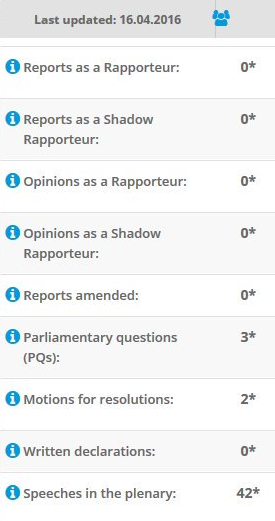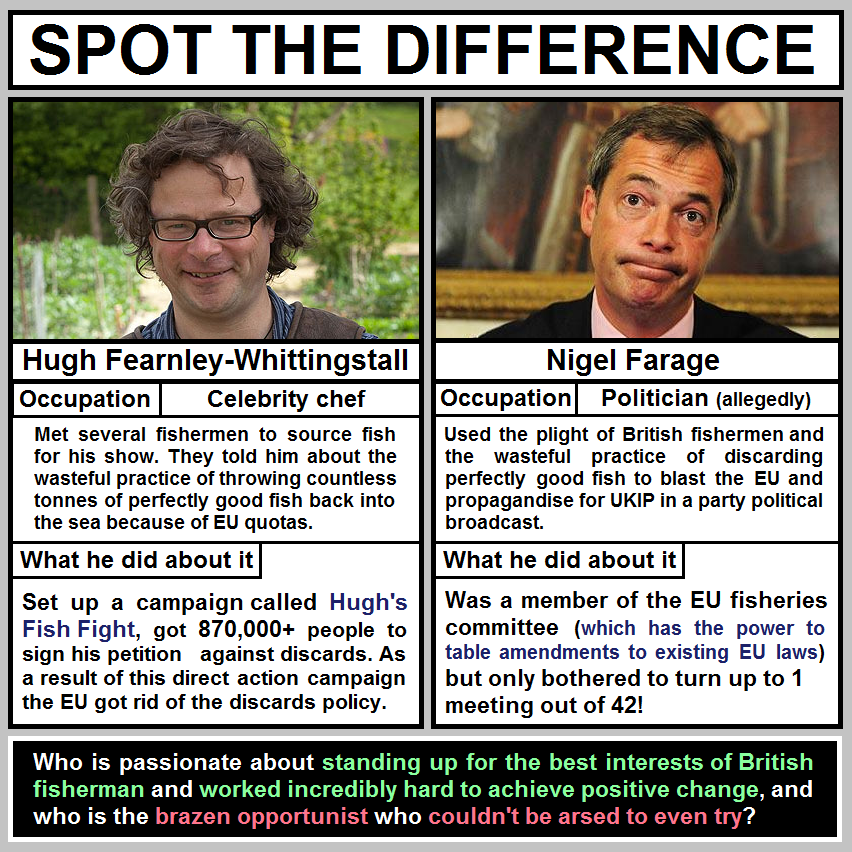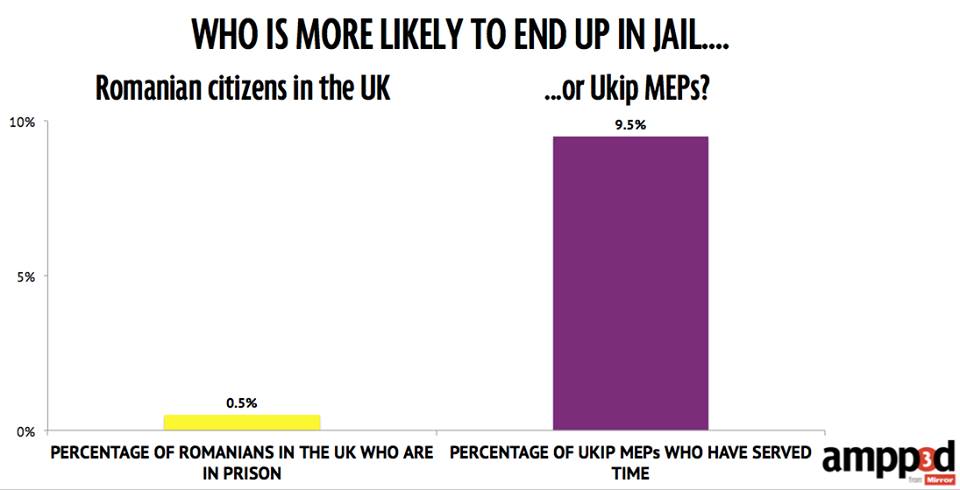The United Kingdom Independence Party (UKIP) and Nigel Farage?
https://www.humantruth.info/ukip.html
By Vexen Crabtree 2017
#EU #immigration #nigel_farage #politics #UK #UK_independence_party #UKIP
UKIP is a right-wing nationalist political party found in the UK, made popular by its anti-immigration and anti-foreigner rhetoric. In its 20-year history1 it has been led most infamously by Nigel Farage and on account of the sensation of his approach he has gained a disproportionate amount of air time in comparison to the support his party actually has. They sometimes have an elected MP or two in the UK government and normally have an elected MEP or two representing the UK in the European Parliament. Nigel Farage has fulfilled such a role, being most infamous for a speech in which he berates them for not being hard-working. Farage, despite receiving a salary from the EU for his position, has spent extended periods of absence from the European Parliament and has been criticized at home for not voting (at all) on issues that affect the UK. UKIP membership since 2002 has varied between 10,000 and 39,000 (the highest figures being those claimed by UKIP itself)2, and the party has struggled to find qualified, educated and capable politicians to fill major roles in a stable manner. A mixture of scandals, in-fighting, lack of detailed policy and public tiredness with Nigel Farage led to UKIP decline in the late 2010s - plus one other cause. The rise of the party was due to the public selecting poor quality politicians as representatives, and the final cause of their decline is the shallow one-liner policies that UKIP promoted, often based on division and xenophobia, became the defining feature of the Conservative Party, causing many UKIP voters to switch.
“As of December 2014 membership of UKIP was 42,200, according to accounts submitted to the Electoral Commission. This is a rise of 10,000 on the previous year´s total. Increases in UKIP´s membership in the past have coincided with European Parliament elections. Membership initially jumped from 10,000 in 2002 to peak at 26,000 members in 2004 when the party won 12 seats in elections to the European Parliament (up from two previously). It subsequently fell again to 16,000 in 2006. Membership has increased every year since 2010. Starting from 15,000, the Party claimed 20,000 members in 2012 and 32,000 as of the Party's submission to the Electoral Commission on 31 December 2013. On 16 June 2014 a party press release claimed around 39,000 members.”
"Membership of UK Political Parties" by Richard Keen (2015)2
“UKIP came last in the European elections of 1994, with 1 per cent of the vote. It came fourth in 1999 with 7 per cent of the vote, third in 2004 with 16 per cent of the vote, and second in 2009 with 17 per cent of the vote. In 2014 it came top, winning twenty-four seats and getting more than one in four of all the votes cast.”
"The European Union: A Citizen's Guide" by Chris Bickerton (2016)3
- A Comparison of Anti-Immigration and Anti-Foreigner Parties in the UK
- Poor Knowledge of the Topics They Campaign On
- Nigel Farage
- The Benefits to the UK of Immigration
- Links
1. A Comparison of Anti-Immigration and Anti-Foreigner Parties in the UK
#British_National_Party #English_Defence_League #National_Front #politics #racism #russia #single_issue_parties #UK #UK_Independence_Party #xenophobia
The National Front (NF), the British National Party (BNP), and the UK Independence Party (UKIP) are three well-known anti-immigration and anti-foreigner parties in the UK. They nestle alongside like-minded groups such as the English Defence League (EDL) and horrible thugs such as Combat 18. Leadership and membership swap between all these organisations relatively freely with most of them being offshoots of one-another. Some are merely drinking clubs for racists and who get an inordinate amount of attention from the media, whilst others have had genuine impact on the populace of the UK. Examples of the latter include UKIP, replaced by The Brexit Party, which became Reform UK. They all have anti-EU policies. Their policies are damagingly shallow and single-minded, but they appeal to nationalists who enjoy simplistic slogans. On account of the long-term damage such parties do to the UK and to other European countries, Russia has been quietly and effectively supporting right-wing parties4,5 in order to further its own interest in a fractured Europe6.
The average age that supporters of these parties left school is significantly lower than for other parties: 55% and 62% of UKIP and BNP supporters (respectively) left school at or before the age of 16; nearly double the average rate of the 4 main parties (at 32%). Possibly linked is the employment status of UKIP and BNP supporters which show an outstandingly high number of manual workers and unemployed, and the lowest proportion of professional and managerial workers.2
For more, see:
- "Single Issue Parties are Dangerous: Against Nationalist and Ethnic Parties" by Vexen Crabtree (2006).
2. Poor Knowledge of the Topics They Campaign On7
“There were, [the UKIP MEP] insisted, `loads´ of laws that left us unjustifiably enslaved to the EU. Indeed, there were `too many to list´. Pushed to name just one, specifically and repeatedly, he left the field after spluttering, prevaricating, patronising and, finally, explaining that EU food refrigeration regulations could compromise the freedom of the Women´s Institute to hold cake sales.”
"How To Be Right... in a World Gone Wrong" by James O'Brien (2019)8
You would expect that if you were an elected representative of a party that campaigned on the issue of EU law being bad, you'd be able to reel off a list of examples. The one thing the UKIP MEP mentioned was nonsense; are they arguing that we should reduce food safety standards for Women's Institute members? For everyone? And are they aware that every other EU country manages to hold cake sales? The problem is, UKIP policy wasn't based on analysis. It wasn't even based on knowledge. It was based on emotion; on division, and on "us versus them". The actual details of what "they" are doing is irrelevant. The point is to stir up hate and division.
The worst part is that the droves of people who voted for UKIP in the 2010s in the UK didn't know enough about the issues to notice that they were being misled by cheap sensationalist campaigning. To fix the problem of the UK populace allowing such degrading politics, we need to improve education levels and improve the quality of mass media reporting in the UK, which veers in almost all outlets towards shock-horror style reporting.
3. Nigel Farage
#EU #france #nigel_farage #UK #UKIP
Nigel Farage is infamous for his pointlessly rude and ignorant rants against EU politicians. In typically poor English - one of the traits he hates in foreigners - he told the entire EU parliament in 2016 that "I know that virtually none of you have ever done a proper job in your lives, or worked in business, or worked in trade, or indeed ever created a job"9. But Farage's voting record is truly atrocious even on issues that directly affect the UK (even whilst claiming EU expenses and wages). For example, of 42 meetings of the EU Fisheries Committee he only turned up once, and in 2014 after he teamed with Marine Le Pen (from Front National, a right-wing nationalist party of France) to raise a motion of their own, he didn't even show up to vote for it10. It is intentional time-wasting. His embarrassing and ill-informed rants have cast the UK a poor light despite the efforts of our other (hard-working) MEPs in the EU Parliament.
Nigel Farage's profile in the EU:


4. The Benefits to the UK of Immigration

I feel it necessary to end with some kind of more realistic approach to immigration, so here's the chapter menu for my page The Benefits to the UK of Immigration:
- Summary
- Open Immigration and Free Labour Markets
- The State of UK Immigration as of the 2011 Census
- The Demographics Crises
- Misinformation and Fake News on Immigration in the UK
- Negative Effects of Immigration
- Curbing Immigration and Nation-Building: New Laws on Citizenship, 2008-2010
- Curbing Immigration and the Post-Brexit Collapse of Labour Availability for Agriculture